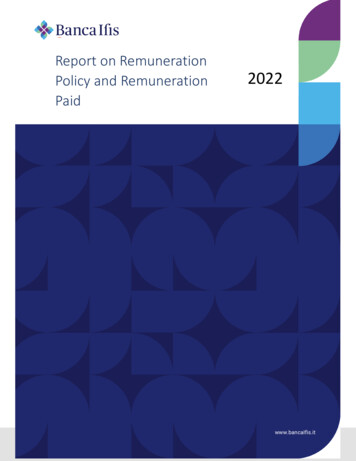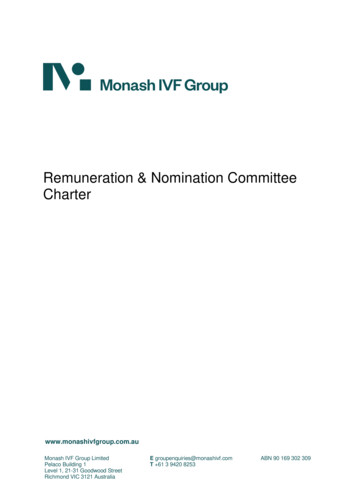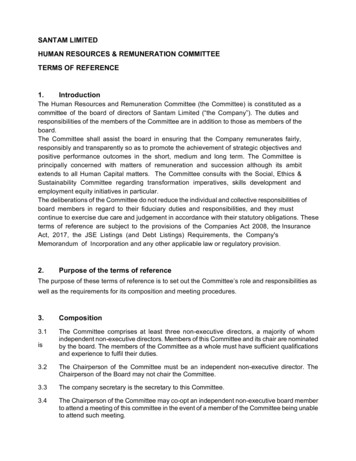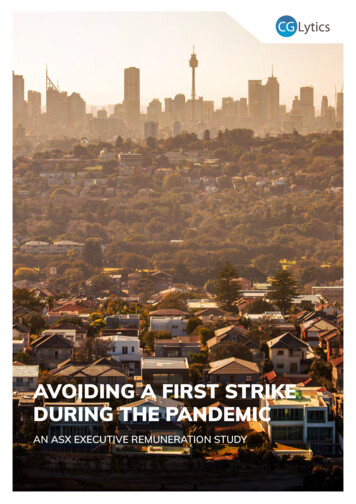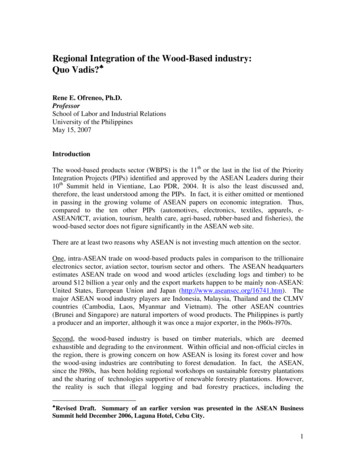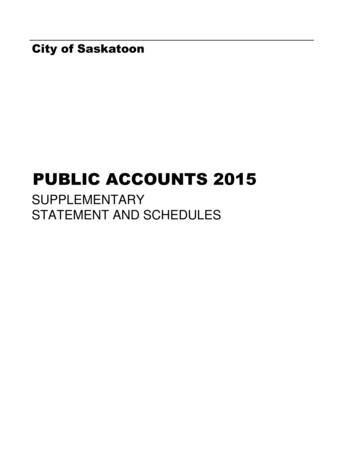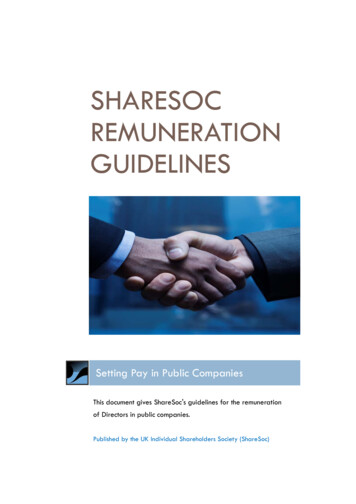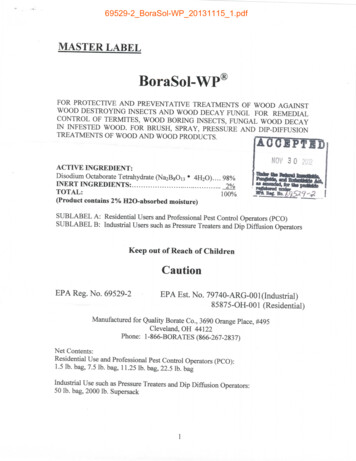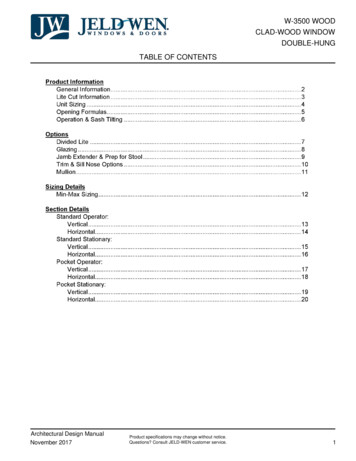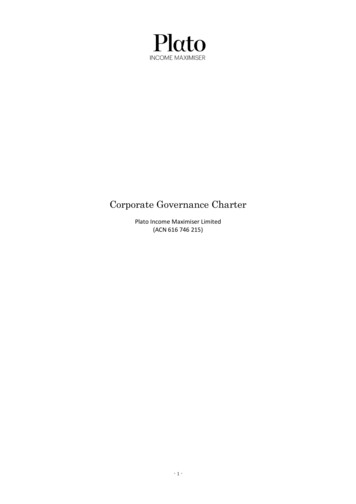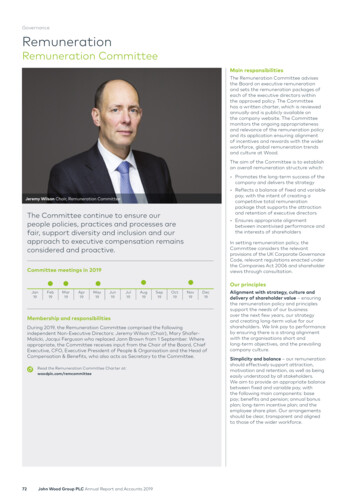
Transcription
GovernanceRemunerationRemuneration CommitteeMain responsibilitiesThe Remuneration Committee advisesthe Board on executive remunerationand sets the remuneration packages ofeach of the executive directors withinthe approved policy. The Committeehas a written charter, which is reviewedannually and is publicly available onthe company website. The Committeemonitors the ongoing appropriatenessand relevance of the remuneration policyand its application ensuring alignmentof incentives and rewards with the widerworkforce, global remuneration trendsand culture at Wood.The aim of the Committee is to establishan overall remuneration structure which: Promotes the long-term success of thecompany and delivers the strategy Reflects a balance of fixed and variablepay, with the intent of creating acompetitive total remunerationpackage that supports the attractionand retention of executive directorsJeremy Wilson Chair, Remuneration CommitteeThe Committee continue to ensure ourpeople policies, practices and processes arefair, support diversity and inclusion and ourapproach to executive compensation remainsconsidered and proactive. Ensures appropriate alignmentbetween incentivised performance andthe interests of shareholdersIn setting remuneration policy, theCommittee considers the relevantprovisions of the UK Corporate GovernanceCode, relevant regulations enacted underthe Companies Act 2006 and shareholderviews through consultation.Committee meetings in 2019Our Sep19Oct19Nov19Dec19Membership and responsibilitiesDuring 2019, the Remuneration Committee comprised the followingindependent Non-Executive Directors: Jeremy Wilson (Chair), Mary ShaferMalicki, Jacqui Ferguson who replaced Jann Brown from 1 September. Whereappropriate, the Committee receives input from the Chair of the Board, ChiefExecutive, CFO, Executive President of People & Organisation and the Head ofCompensation & Benefits, who also acts as Secretary to the Committee.Read the Remuneration Committee Charter at:woodplc.com/remcommittee72John Wood Group PLC Annual Report and Accounts 2019Alignment with strategy, culture anddelivery of shareholder value – ensuringthe remuneration policy and principlessupport the needs of our businessover the next few years, our strategyand creating long-term value for ourshareholders. We link pay to performanceby ensuring there is a strong alignmentwith the organisations short andlong-term objectives, and the prevailingcompany culture.Simplicity and balance – our remunerationshould effectively support attraction,motivation and retention, as well as beingeasily understood by all stakeholders.We aim to provide an appropriate balancebetween fixed and variable pay, withthe following main components: basepay; benefits and pension; annual bonusplan; long-term incentive plan; and theemployee share plan. Our arrangementsshould be clear, transparent and alignedto those of the wider workforce.
Strategic reportInternally fair, externally competitive– ensuring executive directors’remuneration reflect wider workforcearrangements including base salaryincreases. We use external data to informour thinking and ensure remunerationdecisions support attraction, retentionand incentivisation of our executivedirectors and broader leadership team.Stakeholder engagement – theCommittee is mindful of stakeholderexpectations in respect of executive payand actively takes this into account whendeveloping remuneration arrangements.Shareholder consultationAs a minimum, the Committeeengages annually with significantshareholders and voting agencies viawritten correspondence and offers theopportunity to meet with the Chair ofthe Committee. The Committee viewsthese meetings as an opportunity toensure the directors’ remuneration policyand application continues to be alignedwith shareholder views, with shareholderfeedback used to inform the Committeedecision making process. The Committeeensures that appropriate and meaningfulshareholder consultation will take placein advance of any material change beingproposed to the directors’ remunerationpolicy.A summary of any such consultation andthe Committee’s response to substantivepoints raised will be included in therelevant section of the annual report ondirectors’ remuneration. In addition, theCommittee receives input on broadershareholder views through RemunerationCommittee advisors.The Committee is thankful for the timeand considerations conveyed by all of ourstakeholders and trusts that the proposedchanges to the policy demonstratewe have listened to feedback and havebalanced several requirements.Workforce engagementThe Committee will continue its focus onbroader workforce engagement in 2020and beyond, ensuring that remunerationdecisions are aligned and underpinned bydata on the composition, remuneration,engagement, retention and diversity ofthe workforce. We have also been mindfulto consider feedback from the widerworkforce for the first time, through ouremployee Listening Group Network.GovernanceFinancial statementsAdvice provided(including internal teams)May AGM preparationDuring the year, the Committee tookadvice from Deloitte LLP, who wasretained as external advisor to theCommittee. Deloitte adhered to theRemuneration Consultants Groups’Code of Conduct. Deloitte received 89,299 for the provision of services tothe Committee during the year. Thesefees consisted of core services (wherethe cost was agreed in advance) andadditional services (which were chargedon a time and materials basis). As well asadvising the Remuneration Committee,Deloitte provided other services in 2019,predominately related to tax complianceand advisory, systems consultancy andimmigration advice. The Committeehas reviewed the remuneration adviceprovided by Deloitte during the year and iscomfortable that it has been objective andindependent. The Committee has reviewedthe potential for conflicts of interestand judged that there were appropriatesafeguards against such conflicts. Executive remuneration landscape,review of independent advice, feedbackfrom executive directors and confirmapproach to 2020 policy updateCommittee meetings summaryThe Committee met five times to discussremuneration issues and the operation ofthe directors’ remuneration policy. Therewas full Committee attendance at eachof these meetings. The Committee hasa regular schedule of agenda items inaddition to other matters. The followingmatters were considered during the year:February Update on outcomes andarrangements for Annual Bonus Plan(ABP) & Long Term Incentive Plan(LTIP) close out for 2018March Executive director, ELT & CompanySecretary 2019 remuneration reviewapproval Target setting for ABP 2019 and LTIPperformance period 2019-2021 Agreed final outcomes for ABP 2018,2019 delivery milestones (and otherperformance measures already agreed)and deferred payments from 2016 Agreed LTIP outcomes for 2016-2018performance period and discretionaryaward outcomes, 2019-2022arrangements and deferred awardsfrom performance period 2014-2016 Additional items: Incentive planssummary; LTIP grant updateAugust Remuneration policy 2020 renewal,considering shareholder engagementfeedback, external environmentincluding US focus, proposals fromexecutive directors and management,agreed approach including shareholderand voting agency consultation Proposal for 2020 Employee Share Plan Additional items: remunerationproposals and termination for businessunit CEO movements; remunerationarrangements for Chair of John WoodGroup PLC; effectiveness review ofCommittee; incentive plans summary;use of Executive Share Option Scheme(ESOS) as incentive plan and AnnualSalary Review global updateNovember Review of proposed remunerationpolicy 2020, consider updatesincorporating voting agency guidelines,enhancements to the annual report ondirectors' remuneration, shareholderand employee engagement Reviewed ABP projected outcomes2019 and 2020 arrangements Annual salary review 2020 summaryand proposals for executive directors,ELT and company secretary Review Committee charter andobjectives and proposal for 2020objectives Additional items: remuneration reviewChair of Board; variable rewarddivestment of nuclear business;ELT transfers and associatedremuneration; harmonisation overview;workforce disclosure initiative; genderpay reporting update; global rewardpolicy; review and approval formerChair of Board expenses; incentiveplans summary; annual rolling agendafor Committee meetings Review and approval of 2018 Directors’Remuneration Report Employee share plan 2019 enrolmentstatistics and impact on share capital Additional items: proposedremuneration policy review approach;incentive plans summary; approvalof the Chair of the Board’s expenses;gender pay gap reporting update;harmonisation project updateJohn Wood Group PLC Annual Report and Accounts 201973
Governance RemunerationStatement of shareholder votingThe Committee encourages shareholder engagement. Wherethere are a substantial number of votes against any resolution ondirectors’ remuneration, the Committee will seek to understandthe reasons for any such vote and will detail here any actions inresponse to it. In line with the corporate governance code, wherethere are 20% or more votes against remuneration resolutions, theCommittee will support the Board in consultation and actions tounderstand shareholder views.In 2019, remuneration resolutions received 81.78% votes in favourat the annual general meeting in May 2019. We believe theseresults were impacted by the proposal to increase LTIP awards tothe exceptional levels of 250% for the chief executive and 200%for the CFO. As a result of consultation with and feedback fromshareholders, this proposal was withdrawn, and participationlevels reverted to the previous amounts. Due to the timing ofthe decision, several of our shareholders were unable to changetheir voting decision but indicated during engagement meetingsthat they would have voted in favour had they been able to do so.The discretion for the Remuneration Committee to increase themaximum level of LTIP awards, in exceptional circumstances, hasbeen removed from our revised policy.The following table sets out the 2019 AGM voting in respect ofour remuneration matters:ItemAdvisory voteon the 2018annual reporton remuneration(2019 AGM)For (a)AgainstNumber witheld Notes to the Statement of shareholding votinga. Discretionary votes have been added to “For” votes.b. A vote abstained is not a vote in law and is not counted in the calculationof the percentage of votes “For” or “Against” a resolution.74John Wood Group PLC Annual Report and Accounts 2019Remuneration contentsRemuneration Committee72Letter from the Chair75Directors' remuneration policy77Annual report on directors' remuneration86Remuneration in contextSingle figure table and outcomes 2019*8687 to 92Long Term Incentive Plan interestsawarded during the year*93Payments to past directors*93Payments for loss of office*Statement of directors' shareholdingand share interests *9394 to 95TSR performance summary &Chief Executive remuneration96Statement of implementation of remunerationpolicy in the following financial year98Chair of the Board and non-executive directors*100*AuditedUnless otherwise noted, the remaining sections of the annualreport on directors remuneration are not subject to audit.
Strategic reportGovernanceFinancial statementsLetter from the ChairDear ShareholderI am pleased to present the remunerationreport for the year ending 31 December2019, on behalf of the Board and as Chairof the Remuneration Committee. Thisincludes our proposed revised directors’remuneration policy, and its associatedfuture application, which we will beseeking your support for at the 2020Annual General Meeting. The purpose ofthis report is to set out the remunerationof executive directors demonstratingalignment to remunerationarrangements for the wider workforce,company culture and shareholder valuecreation through the delivery of the shortand long-term strategic objectives of theCompany.This year we engaged with shareholdersand proxy agencies and with ourremuneration consultants, Deloitte, toreview the existing policy and proposechanges where appropriate. We believeour revised policy is fit for purpose, thoughwe will continue to monitor the risk ofpeers in the US and Australia recruitingkey employees based on materially higheroverall remuneration packages, which arecharacteristic of these markets.Robin Watson and David Kemp continueto lead our team to deliver against a clearset of demanding financial and operationalobjectives, against a challenging macroenvironment and political uncertainty.The Board believes Wood is well placed todeliver longer term growth and value forour shareholders. The remuneration policyis designed to ensure fair and competitiveexecutive director remuneration, ensuringtheir contribution to Wood reflects ourvalues and culture, balancing long-termalignment with our shareholders’ interests.2019 contextIn 2019 the Committee has continued toenhance our engagement activities withthe wider workforce to ensure our peoplepolicies, practices and processes arefair, support diversity and inclusion andour approach remains considered andproactive. Details about our activitiescan be found within this report and welook forward to further engagement withour global workforce during 2020.The remuneration resolutions received82% of votes in favour at the AGMin May 2019. We believe these resultswere impacted by the proposal toincrease LTIP awards to the exceptionallevels of 250% for the Chief Executiveand 200% for the CFO. As a result offeedback from some shareholders andthe voting institutions, this proposalwas withdrawn, and participation levelsreverted to the previous levels.Due to the timing of the decision, severalshareholders were unable to changetheir voting decision but indicated duringengagement meetings that they wouldhave voted in favour had they been ableto do so. We were also appreciativethat ISS and Glass Lewis changed theirrecommendation from “against” to “for”.Proposed changes to the policyThe Committee has continued to pay closeattention to the executive remunerationenvironment including the impact of thechanges to the corporate governancecode ensuring we continue to makeremuneration decisions that reflect theneeds of the business and which remain inline with the Remuneration Committee’skey principles outlined in page 72. As we stated in the 2018 Directors’Remuneration Report, the maximumpension opportunity for any newexecutive director will be aligned tothe levels for the wider workforce intheir country of employment. Existingexecutive directors will continue toparticipate at a maximum of 15% ofsalary under their current arrangements.From 1 January 2022 the maximumcompany pension contributions for allexecutive directors will reduce to therate in place for the wider workforce inthe country in which they are employed,currently 9% in the UK.Policy reviewIn 2019 we undertook a full review ofthe remuneration arrangements forexecutive directors in preparation forour third shareholder vote on policy atthe 2020 AGM. We have been cognisantof the political environment includingthe enhanced requirements of theCorporate Governance Code and thoseof the voting institutions. We proactivelyengaged with our key investors at theearly stages of our review, meeting withshareholders representing circa 34% ofthe shareholder base in the summer of2019, to consider how we enhance ourremuneration arrangements to furtheralign to their interests.We were particularly interested ingathering views on alternative proposalsfor long term incentivisation and whetherto continue with the existing LTIP modelor introduce restricted stock only, or acombination of both. Having listened tothe feedback, we have decided to retainthe LTIP model, ensuring performancemeasures remain stretching and withinmanagement control.We continue to be mindful of ourresponsibility for fair and transparentspend on reward, putting thewellbeing of our people at the heart ofdelivering our strategic objectives, andensuring that our executive directors’remuneration is aligned with the widerworkforce in the country where they arebased. In the global market in whichWood operates, the Committee isaware of the remuneration challengesand imbalances, particularly betweenthe United Kingdom, which has greatercorporate governance requirements,and the USA, which typically offerssignificantly greater variable rewardopportunities, including substantialrestricted stock awards. This is a concernas 50% of Wood’s revenues are in theAmericas and we see the USA as a majorsource of executive talent – both in termsof attraction and potential loss.We believe the proposed policy changesare well aligned with feedback receivedas part of our shareholder engagement.They also meet the Committee’sremuneration principles whilst offering adegree of flexibility to adapt to changingbusiness needs and performance: The shareholding requirement for theChief Executive will be increased to250% of base salary, from 200%; therequirement for the other executivedirectors will be increased to 200% ofbase salary, from 100%. We are introducing a post cessationshareholding requirement with 100%of shareholding requirements to beheld for one year following cessationof employment, reducing to 50% inthe second year following cessation ofemployment. This requirement will applyto shares received from share awardsgranted from 2020 onwards. We are enhancing and simplifying thedefinition of shareholding. Executivedirectors are required to hold shares inJohn Wood Group PLC, with the value ofthose shares expressed as a percentageof salary. The holding will be built upfrom after-tax share awards which arenot subject to any further performanceconditions and those matched via theemployee share plan, if applicable. Untilshareholding requirements are satisfied,executive directors are not generallypermitted to sell any shares in theCompany unless to cover tax. Life assurance will be provided to theChief Executive at the rate of four timesannual base salary, in line with that ofthe wider workforce. Previously it wasprovided up to the greater of 2,500,000or four times annual base salary. We have removed the Committee’sdiscretion to award up to 250% of basesalary in exceptional circumstancesbut retain the LTIP as a key long-termincentive with maximum opportunity at200% of base salary. We have maintained the discretion toreduce or cancel awards, in line withmalus and clawback provisions and theability to adjust performance targets,if more appropriate and they are notmaterially easier to satisfy.John Wood Group PLC Annual Report and Accounts 201975
Governance RemunerationShareholding requirementsDuring investor engagement,shareholding achievement was discussedand it was highlighted that neitherexecutive director has reached hisrequired shareholding in John WoodGroup PLC, reflecting their short term ofoffice and that for a number of years theLTIP has resulted in minimal awards; weexpect this to improve over the next fewyears with better company performance.It is important to note that Robin Watsonhas proactively been working towardsachieving his shareholding requirementsand has paid over 540,000 from his owncash resources to meet the tax liabilityon vesting shares, although the Policydoes allow him to sell shares to meetsuch liability (in line with typical marketpractice). In addition, both executivedirectors have elected to purchaseshares via the Employee Share Plan(ESP), with both contributing 10% oftheir gross salary which is deducted fromtheir monthly salary; Robin Watson hasinvested more than 132,000 and DavidKemp more than 76,000. This clearlydemonstrates their commitment tomaterially investing in the Company andaligning their interests with those of ourshareholders.Remuneration and performanceoutcomes for 20192019 proved to be another challengingyear due to market conditions, inaddition to wider political and economicuncertainty. Against this backdrop,Wood delivered growth in 2019 andfinancial performance was in line withexpectations.Annual bonus planAs in previous years, the Committeeconsiders the overall performance ofthe business as well as the individualperformance of the executive directors.Bonus measures were split betweenfinancial, HSSEA and non-financialmeasures with a balance of 60%,10% and 30% respectively; full detailof the targets and outcomes can befound on page 88 of the report. Insummary, annual bonuses of 66.9% ofmaximum were achieved but on broaderconsideration of the overall shareholderexperience and the decline in the shareprice during the year, the RemunerationCommittee took the decision to reducethe final outcome to 62% of maximum.LTIPPerformance measures for LTIPperformance period 2017-2019 werebased on relative Total ShareholderReturn (TSR) and Earnings Per Share(EPS) weighted 50% for each measure.76The EPS target was set at 44.8 cents atthreshold and 74.8 cents at maximum;EPS achievement of 29.3 cents anddid not meet threshold performance,resulting in zero award for this measure.The TSR performance was below 50thpercentile resulting in zero award for thismeasure. Therefore, no award has beenrealised for the executive directors forthe second year running. The fact that noLTIP will vest again in 2019 is extremelydisappointing to the Committee, despitethe positive strategic and operationalprogress achieved. With the benefit ofhindsight, the Committee now realisesthat it underestimated the depth andlength of the oil and gas downturn andset overly optimistic EPS targets backin 2017. Setting 3 year targets in volatilemarkets is an ongoing challenge.Proposed policy application for 2020The following section details the changesthat we plan to make in implementingthe proposed new policy in 2020.Base salary – in January 2019 weincreased salaries in line with ourprevious communications to you in 2017and 2018. In addition we determinedto apply a further 2.4%, which was thestandard UK cost of living increase beinggiven to our wider workforce in theUK in 2019; this would have increasedRobin Watson’s salary from 690,000to 768,000 and David Kemp’s from 450,000 to 486,400. However bothexecutive directors decided to defer the2.4% increase until 2020, so their salarieswere increased to 750,000 for RobinWatson and 475,000 for David Kemp in2019. This was supported by shareholdersthrough the remuneration vote at the2019 AGM.The cost of living increase applied to ourwider workforce in the UK for 2020 is2.5% and the Committee has appliedthis to the base salaries of the executivedirectors in order to keep them at paritywith the cost of living over the past12 months. As a result, and includingthe increase deferred from 2019, RobinWatson’s salary will increase to 787,200and David Kemp’s to 498,560.Annual Bonus Plan –The maximum bonusopportunity for the Chief Executive willremain at 175% of base salary, and 150%of base salary for the CFO, less than thePolicy maximum of 200% of base salary.Full details of the corporate and personalobjectives, which account for 30% of theannual bonus opportunity, are containedon page 99. The other performancemeasures will be a measure of profit,accounting for 30% of the annual bonusopportunity; cash generation, alsoaccounting for 30%; and HSSEA at 10%.John Wood Group PLC Annual Report and Accounts 2019Long Term Plan – we will continue toanchor participation levels on 200% ofsalary for the Chief Executive and 175%for the CFO. However, having carefullyconsidered the material reduction in theshare price during 2019 and feedbackreceived, the Committee has determinedto apply one-off discretion and reduce theparticipation levels for 2020 by 15%; thisresults in a participation level of 170% ofsalary for the Chief Executive and 149%for the CFO. We will monitor share priceperformance during 2020 with a view toreinstating the previous participation levelsof 200% and 175% of salary respectivelyin 2021.As in previous years, and detailed in theproposed revised policy, these awards arenot released until five years from grantin line with our focus on creating longterm value for shareholders by linking asignificant portion of executive directors’remuneration to long-term performance.For the performance period commencing2020 we will retain the same threeperformance measures as 2019, RelativeTSR, Gross Margin Improvement andOverhead Percentage Improvement,which are well aligned to our strategy andshareholders’ interests. The detail andthreshold and maximum targets can befound on page 99.I trust that in the report for 2019 wehave clearly explained our applicationand intentions regarding futureimplementation of the directors’remuneration policy. I will step downfrom the Remuneration CommitteeChair position following the AGM. JacquiFerguson will take on the Chair positionthereafter and I wish her all the very bestin her new role. I would like to thank allthose who have been involved in theremuneration process over the years fortheir dedicated help and support.These have been challenging times insetting executive remuneration. We wantto ensure we motivate and retain theexecutive management at Wood, who webelieve are of the highest calibre, whilstrecognising a need for alignment withthe shareholder experience. Finding thatbalance has not always been easy as somuch has happened that has been beyondthe control of management. Nonethelesswe took the difficult decision to applydiscretion in bonus payouts and LTIP grantsthis year to reduce the executive directorpackages. We believe we have achievedthe right balance and look forward toyour support on the relevant resolution.Signed on behalf of the Board and asChair of the Remuneration Committee.Jeremy WilsonChair, Remuneration Committee
Strategic reportGovernanceFinancial statementsDirectors’ remuneration policy 2020In accordance with section 439A of the Companies Act, this policy will beproposed as a binding resolution for approval at the AGM in 2020. It isintended that this policy will take effect from the date of the AGM, subjectto shareholder approval. This policy will replace in full the policy set out in the2016 annual report which was approved by shareholders at the 2017 AGM.If approved, the Committee will put a revised policy to shareholders againno later than the AGM in 2023. If not approved, the Committee will presenta revised policy for a further shareholder vote within twelve months.IntroductionThe objective of the remuneration policyis to provide a remuneration and benefitspackage that promotes the long-termsuccess of the organisation and supportsthe strategy. It does this through abalance of fixed and variable pay, withthe intent of creating a competitive totalremuneration package which attractsand retains executives while creatingan appropriate alignment betweenincentivising executive performance andthe interests of stakeholders.Executive directors’ remuneration ismade up of fixed and variable rewardwith the following components: basesalary, benefits and pension, annualbonus plan (ABP), long term incentiveplan (LTIP) and employee share plan(ESP). The future policy table on page 79summarises the remuneration policy inrelation to these components.Full details of the application of thispolicy are contained in the annual reporton directors' remuneration and theillustrations of future policy applicationare updated annually in the scenariocharts on page 85.Scope of the RemunerationCommitteeWood’s Remuneration Committee hasoverall responsibility to the Board andother stakeholders to oversee and beresponsible for all aspects of remunerationand benefits for the executive directorsincluding the remuneration policy,ensuring appropriateness and governance.In addition, in line with the CorporateGovernance Code, the Committee is alsoaccountable for overseeing remunerationand benefits for members of the executiveleadership team and the companysecretary. The Committee achieves thisby ensuring alignment of compensationphilosophy, incentives and rewards withthe wider workforce and prevailingculture at Wood.Read the global reward policy whichapplies to all employees of Wood at:woodplc.com/rewardpolicyRead the RemunerationCommittee Charter at:woodplc.com/remcommitteeCommittee decision making processThe Committee is mindful ofshareholder expectations in respect ofexecutive pay and proactively carried outextensive engagement with shareholdersduring 2019, incorporating feedbackin the future policy proposals andapplication for 2020 and beyond. Wehave also been mindful to listen to theviews of the wider workforce throughour employee listening group network.In determining the remunerationpolicy, the Committee considered therelevant provisions of the UK CorporateGovernance Code and guidelinesproduced by relevant advisory bodiessuch as the Investment Association.The Committee also received inputfrom the Chair of the Board, the ChiefExecutive, Group CFO, ExecutivePresident of People & Organisation andthe Head of Compensation & Benefits,while ensuring that conflicts of interestwere suitably mitigated.The policy for executive directors is alsodesigned in line with the philosophy andprinciples that underpin remunerationthroughout the organisation, with thepolicy for executive directors and seniorleaders more heavily weighted towardsvariable pay than the wider workforceensuring longer term alignment withshareholders.The Committee will exercise discretionwhen determining the outcomes ofshort and long-term variable rewardin addition to the formulaic outcomesconsidering any market conditionsand relevant environmental, socialand governance (ESG) matters. Suchfactors may include (but are not limitedto); workplace fatalities and injuries,significant environmental incidents,large or serial fines or sanctions fromregulatory bodies and/or significantlegal judgements or
the Committee's response to substantive points raised will be included in the relevant section of the annual report on directors' remuneration. In addition, the Committee receives input on broader shareholder views through Remuneration Committee advisors. The Committee is thankful for the time and considerations conveyed by all of our
